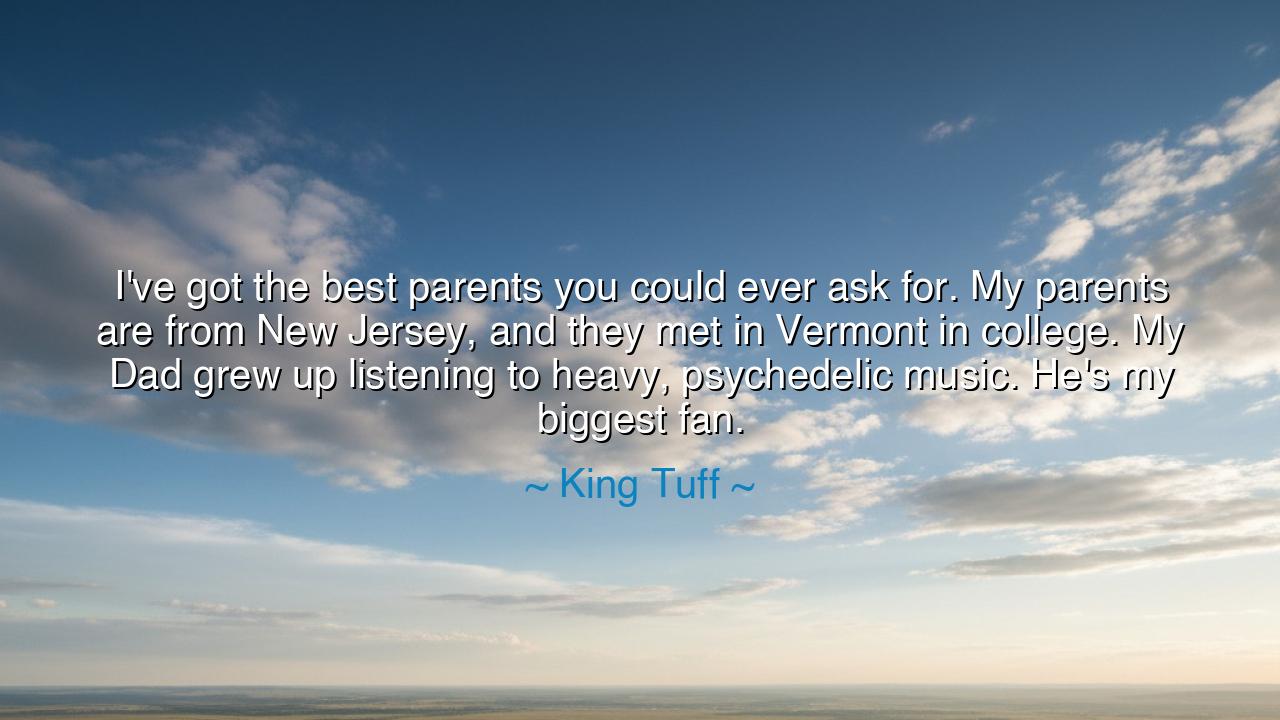
I've got the best parents you could ever ask for. My parents are
I've got the best parents you could ever ask for. My parents are from New Jersey, and they met in Vermont in college. My Dad grew up listening to heavy, psychedelic music. He's my biggest fan.






“I’ve got the best parents you could ever ask for. My parents are from New Jersey, and they met in Vermont in college. My Dad grew up listening to heavy, psychedelic music. He’s my biggest fan.” So spoke King Tuff, a musician whose words, though gentle and simple, carry a wisdom that glows like the steady flame of a hearth. Beneath this reflection lies one of life’s oldest and most sacred truths — that the roots of who we are often lie in the quiet love and influence of those who raised us. The ancients called this bond filial devotion, the recognition that from the hearts of our parents flows the first music of our lives.
In these few lines, King Tuff does not boast of his fame or his art, but of something deeper — of gratitude. His success, his creativity, and his spirit are not born from isolation, but from a lineage of warmth, inspiration, and love. The mention of his father listening to heavy, psychedelic music is not a trivial detail; it is a thread in the tapestry of inheritance. Just as one generation plants seeds that another will harvest, so too do parents plant dreams in their children — sometimes through words, sometimes through example, and sometimes through the silent rhythm of their own passions.
In the ancient world, such reverence for one’s parents was the foundation of all virtue. The philosopher Confucius taught that harmony in the family was the first step toward harmony in the world. The child who honors his parents, he said, honors the very order of heaven. Even in the Western traditions, the same truth was known: in the old laws of Moses, among all the commandments carved in stone, one was set apart — “Honor thy father and thy mother, that thy days may be long upon the earth.” To cherish one’s parents is not merely to love them, but to acknowledge the roots of one’s being, to understand that identity is a continuum — a melody that began before our first breath and will continue after our last.
King Tuff’s story is also a hymn to the power of encouragement. To have a parent who believes in you is a gift beyond measure. His father, his “biggest fan,” stands not only as a figure of family but as a symbol of the faith that gives birth to courage. Every artist, every dreamer, every builder of something new must face doubt — yet how much easier that journey becomes when a loving voice reminds them, “You can.” History itself offers us such examples: Mozart’s father, who taught him to play before he could write; Michelangelo’s patrons, who saw the divine spark in his chisel; or Helen Keller’s teacher, Anne Sullivan, who nurtured light where the world saw only darkness. Behind every great act of creation, there is a hand that steadied the soul in its beginning.
Yet there is also in this quote the beauty of heritage transformed. The father who once listened to the strange, mind-expanding sounds of psychedelic music unknowingly sowed the seeds of his son’s own artistic voice. The son did not simply imitate — he inherited the spirit of exploration, that restless hunger for sound and meaning that once stirred his father. Thus, creativity passes not merely through blood, but through imagination and curiosity. The old songs of one generation become the foundation for the new anthems of the next. This is the sacred rhythm of human culture — the eternal duet between parent and child, between memory and invention.
And so, the lesson is clear: remember your roots. In a world that celebrates independence, do not forget interdependence. None of us stands alone; we are built from the love, the music, the laughter, and even the struggles of those who came before. To honor one’s parents is not only to thank them for what they have given, but to live in such a way that their dreams are carried forward through us. Even if our paths diverge from theirs, the gratitude remains — for they gave us not a map, but the courage to draw our own.
So, my child, take this wisdom to heart. Speak often of your parents, not in passing, but in reverence. Remember the songs they loved, the lessons they taught, the sacrifices they made in silence. If they are still living, cherish them; if they are gone, honor them through your deeds. For to forget one’s parents is to forget one’s beginning, and to remember them is to keep the fire of one’s origin forever alight. Like King Tuff, be proud to say, “They are my biggest fans” — for in truth, it is their unseen applause that first set your heart to beating and your life to song.






AAdministratorAdministrator
Welcome, honored guests. Please leave a comment, we will respond soon